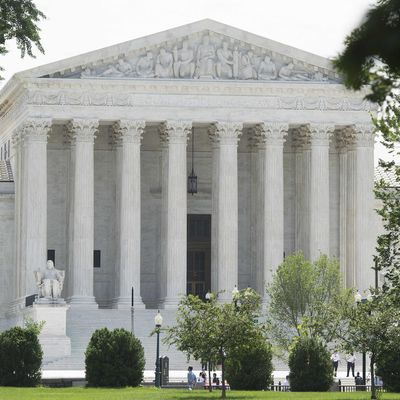
The other big, happy surprise on Thursday for the Obama administration — after its win in King v. Burwell, aka the Obamacare case — was its win in Texas Department of Housing and Community Affairs v. Inclusive Communities Project, a mouthful of a case in which the Supreme Court spared Title VIII of the Civil Rights Act of 1968, otherwise known as the Fair Housing Act.
The case was a sleeper because no one paid nearly as much attention to it in the run-up to King or the same-sex marriage case. Yet it could’ve easily turned the Roberts Court into the most anti-civil-rights court in history — especially after deplorable rulings gutting the Voting Rights Act of 1965 and curtailing integration and diversity in public school districts.
Remember the adage, “The way to stop discrimination on the basis of race is to stop discriminating on the basis of race”? That was Chief Justice John Roberts in 2007, and in Inclusive Communities he was in the minority of the split 5-to-4 decision — Justice Anthony Kennedy carried the majority decision with the court’s liberals. Together, they accepted that a fair reading of the Fair Housing Act allows what is known as “disparate impact” claims — that is, landlords, banks, and even state entities are prohibited by the law from advancing policies or practices that have a “disparate impact” on minority populations.
You may remember the racist Brooklyn landlord who “put in white tenants” in place of black residents, whom he’d buy out for a few grand in order to later offer the properties to more affluent renters. The Fair Housing Act roundly prohibits such outright cases of housing discrimination.
But it’s rare for landlords or even financial institutions — who have demons of their own — to be caught on the record making explicit their racist motivations. So instead the law allows for renters and others who fall prey to such practices to bring “disparate impact” claims — which only require them to prove that the alleged wrongdoers observe policies that may not have targeted them specifically, but did affect a swath of similarly situated minorities. The Department of Justice has a full page of the kinds of cases it brings against shady entities.
(Countrywide, under DOJ supervision, is in the process of paying out $335 million to thousands of qualified black and Latino borrowers who were made to ask their “non-applicant spouses to sign away their rights in jointly held property.” That’s just one of many examples of how pervasive these practices can be, and the law’s power to curb them.)
So Inclusive Communities was a big deal, because it threatened to take away the ability to invoke the Fair Housing Act whenever applicants were denied housing but didn’t really know the reason why. In the opinion, Kennedy began by acknowledging that residential segregation and “its vestiges remain today, intertwined with the country’s economic and social life,” followed by a short history of the ghettoization of America, civil-rights unrest in the ‘60s, the damning findings of the Kerner Report, and the assassination of Martin Luther King Jr., all of which provided the groundswell for the Fair Housing Act.
Relying on other laws, amendments, and precedents interpreting historic civil-rights statutes, Kennedy took a deep look at the text of the FHA and concluded that disparate-impact claims were lawful under it. And funnily enough, Kennedy also took aim at the dissenting conservatives — like Roberts did in King — by citing from a book Justice Antonin Scalia wrote on statutory interpretation: “If a word or phrase has been … given a uniform interpretation by inferior courts … a later version of that act perpetuating the wording is presumed to carry forward that interpretation.”
This is particularly reassuring because every federal appeals court to have weighed the question of disparate impact in the housing context has found, for decades, that it’s allowed under the FHA. And this has brought much weeping and gnashing of teeth to banks, insurance companies, and the Chamber of Commerce, all of which implored the Supreme Court to reject disparate impact liability. No dice, according to the court.
The separate dissenting opinions by Justices Samuel Alito and Clarence Thomas have some legal meat to them but are ultimately not worth revisiting — The New Republic’s Rebecca Leber helpfully summarized why it may be best to leave them alone. (Hint: It has to do with why blacks do so great as NBA players. Yes, really.)
Ultimately, Inclusive Communities breathes new life into the Fair Housing Act — the Supreme Court has been this close to dealing a blow to it on two prior occasions. And for now, it seems like the best way to stop discrimination on the basis of race in housing is to simply stop being awful to minorities who apply for housing. Or else risk getting slapped with a federal lawsuit.





























